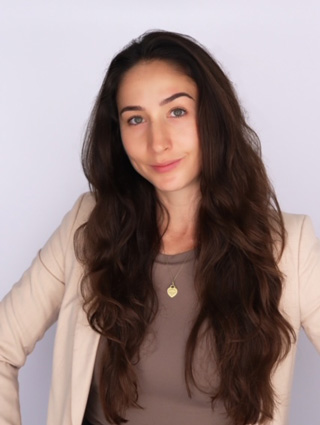What makes a person flourish and lead a fulfilling life?
Many factors can determine this: life experiences, environmental factors, culture, education—to name a few. Nona Kiknadze, a graduate student in the University of Miami School of Education and Human Development, has spent her academic life in the pursuit of identifying how people can lead their best lives even while facing adverse conditions.
“I conceptualize flourishing as a process rather than an achievement,” she said. “It exists at different levels, such as individual flourishing, relational flourishing, and community flourishing. We know that people are impacted by systems, and these are made up of people. We need to look not just at the individual but also at people in community with others to better understand this concept.”

Kiknadze, who is working on a doctorate in counseling psychology, has worked with professor Blaine Fowers, who has done extensive work on the subject, on several academic papers exploring the topic of flourishing and will be teaching a class called “The Art and Science of Flourishing” next semester. The course, cross-listed in the departments of psychology and education as EPS 292, PSY 275, is now open for registration for Spring 2025.
Students will be expected to use their own personal experiences to develop a model of what it takes to create a fulfilling life. The students will read and evaluate science-based studies and frameworks that empirically examine flourishing, well-being, and health, and compare these findings with a vast range of thinkers, from the great philosophers like Aristotle to Confucius, as well as writers on Buddhism, social, and other major cultural and religious perspectives, she said.
“I want students to ask important questions. I want to create an environment where they want to ask questions of themselves,” she said. “I want to foster curiosity and realize that maybe a single discipline within science or the humanities may not have all the answers.”
Fowers finds Kiknadze to be an impressive academic and “one of the best doctoral students I have seen in over 30 years.”
“She consistently takes strong initiative, whereas many students wait to be told what to do,” he said. “She has independently sought many professional opportunities, including funding. She has been successful in many of these endeavors because she has great ideas and is able to express them so clearly.”
Daughter of a mother who was in the United States diplomatic corps, Kiknadze lived in Beijing, China; Paris, France; and O’ahu, Hawaii, during her formative years. She mastered the Chinese language and has worked to develop proficiency in Spanish, French, and Hawaiian languages. She developed an interest in understanding “how people see the world and relate to each other through a different culture.”
“Growing up in environments like that, I was constantly exposed to social systems and different beliefs and different political environments, and that fed this curiosity that I have to understand people,” she said.
Kiknadze has written about a dozen academic papers on the subject of flourishing, including how these principles can be embraced by people who experience disabilities or those who are marginalized. She has also secured over $100,000 in grants, which has allowed her to do research. As a practicum student clinician, she has worked in environments like the University’s Counseling Center to provide therapy for young adults, an eating disorder clinic working with teens and adults with serious mental illness, and a pediatric hospital working with children and families with behavioral and developmental challenges as part of her doctoral training.
In 2023 she worked with Mary Avalos, a research professor in the Department of Teaching and Learning, on a project to introduce curriculum into the Miami-Dade County Public Schools that taught teachers to implement a pilot version of courses focusing on wellness and flourishing for young people.
“Working with Nona last year to provide professional development on well-being to a group of high school teachers was a pleasure,” said Avalos. “Not only was she extremely knowledgeable about how to foster and promote well-being or flourishing, Nona instilled a calm that was taken up by the teachers when she presented the information.”
That calm and friendly demeanor may be fostered by one of her other practices. Kiknadze is a well-known yoga and mindfulness teacher. She has practiced yoga since 2015 when she sought relief and mobility from several knee injuries. She has taught yoga at the Marine Campus as part of its Mental Health Ambassadors program and also does pop-up classes organized by the Department of Psychology and other Miami community organizers.
Kiknadze, who has been a teaching fellow in several projects, is currently involved in a Yale University-sponsored project called “Life Worth Living Graduate Pedagogy Fellowship.” She works with professors at at the University of Miami and across the country with the mission of establishing academic communities that can engage in effective dialogues.
“The mission is to develop pedagogy so we can tackle life’s big questions while bringing in perspectives from clinical and other cultural sciences, as well as from historians and philosophers, so that there is space for interdisciplinary dialogue,” Kiknadze said.

